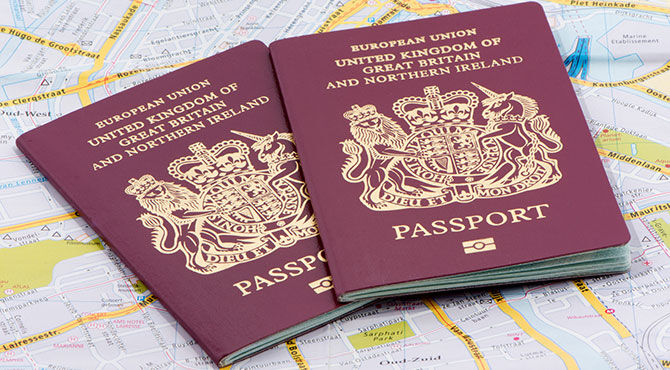Government orders probe to formulate new migration policy
An inquiry is to be launched to which will assess the role of immigration in the UK, and will attempt to identify what a future immigration system would require once the UK has left the EU.

Keeping the UK as a hub of talent
Home Secretary Amber Rudd, who revealed the MAC inquiry in an article in the Financial Times on Thursday, said the new immigration system that would be needed when the UK has left the EU, must work in everyone's interest.“Put simply, the UK must remain a hub for international talent. We must keep attracting the brightest and best migrants from around the world,” she said.Her move comes after many business groups had expressed concerns that they would be denied the skills they need once free movement of people ends.“I want to reassure all those who have outlined their views that the government is listening and that we share their desire to continue to welcome those who help make the UK such a prosperous place to live,” said Ms Rudd.In a letter to Prof Alan Manning, chairman of the MAC, she said the government needed to devise a new immigration system under which “we will be able to apply different immigration rules and requirements according to the UK's economic and social needs”.Immigration Minister Brandon Lewis told BBC Radio 4's Today programme, “Free movement of labour ends when we leave the European Union in the spring of 2019 – we're very clear about that. There will be a new immigration system in place from the spring of 2019 and that will be outlined in the Immigration Bill that will go through parliament next year.”UK government committed to halving net migration
In their election manifesto, the Conservatives re-committed themselves to bringing net migration down from its current 248,000 a year (including 133,000 from the EU) to below 100,000. Mr Brandon would not commit himself to when this could be achieved but said the target remained the government's “long-term aim”.Reacting to the MAC inquiry, Tim Thomas, director of employment and skills Policy at the manufacturers’ organisation EEF – whose members' workforces comprise 11 per cent EU nationals – said, “This is a welcome announcement which reflects industry’s concerns. The Migration Advisory Committee is best placed to provide independent and evidence-based thinking on what a new model for EU migration could and should look like after Brexit, with employers key to the new model’s design.“Manufacturers rely heavily on EU workers as well as non-EU nationals to fill crucial roles within their businesses and any immediate restriction in this supply would only exacerbate the current skills crisis in the sector.“Many manufacturers will see today’s announcement as a first step, with the government for the first time acknowledging that future migration changes will be implemented in a measured way over a period of years. Whilst this announcement was much needed, the fate of EU nationals already in the UK before Brexit now needs settled quickly, positively and conclusively.”Josh Hardie, deputy director-general of Confederation of British Industry, also welcomed the move, describing it as a “sensible first step”. He added, “Businesses urgently need to know what a new system will look like – during transition and afterwards.”Related news:
- Mayor leads call for London to stay open to foreign talent
- Brexit talks resume over status of EU expats
- Falling immigration leaves labour market at 'tipping point'
Adam Marshall, director-general of the British Chambers of Commerce, commented, “We welcome the home secretary’s decision to commission rigorous and independent analysis to inform the shape of our future immigration system. Business communities across the UK tell us that immigration rules need to be based on an objective look at economic trends and needs, which are better evaluated by the experts on the Migration Advisory Committee than by politicians or commentators. “Over the coming years, changes to the UK immigration system should be based on firm evidence, input from employers, and a clear understanding of the different requirements facing each region and nation.“While businesses are committed to filling vacancies locally wherever they can, they will still need access to both EU and global candidates with a range of skills in the future. We will work to ensure that the views of business communities all across the UK are heard loud and clear by the Migration Advisory Committee over the coming year.”Mr Marshall added that businesses need clear information to support their existing employees “and to know, right now, who they can hire with confidence over the coming years”.A note of criticism was sounded by Sir Ed Davey, Liberal Democrat home affairs spokesman, who wanted to know why the government had not commissioned the MAC to undertake its study a year ago, immediately after the referendum to leave the EU. “The NHS, businesses and universities that depend on European citizens need answers now, not in another 14 months' time,” he said.
Read David Sapsted's article on Establishing Right to Remain – which discusses the uncertainty over immigration which the UK faces following Brexit – in the Summer 2017 issue of Relocate Magazine.
For related news and features, visit our Brexit section.
Access hundreds of global services and suppliers in our Online Directory

Get access to our free Global Mobility Toolkit

©2024 Re:locate magazine, published by Profile Locations, Spray Hill, Hastings Road, Lamberhurst, Kent TN3 8JB. All rights reserved. This publication (or any part thereof) may not be reproduced in any form without the prior written permission of Profile Locations. Profile Locations accepts no liability for the accuracy of the contents or any opinions expressed herein.




























